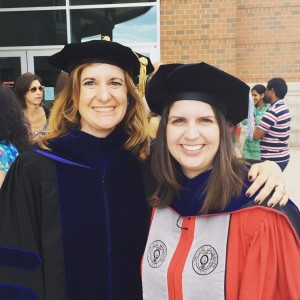Professional organizations and their meetings are one of the best parts of academic life. You get access to important professional resources and networks. Conferences are in fun locations – some of my favorites have been Melbourne, San Diego, New Orleans, Lausanne – and once there, you get to hang out with a bunch of people who also nerd out on good research. But, professional organizations and conferences can also feel overwhelming and mysterious to new graduate students.
Why join a professional organization?
The big question is – why join an organization in the first place? They are expensive to join, and once you graduate, they are even more expensive to maintain membership. But, they do offer a host of benefits.

Me, Kelly Musick, and Tasha Snyder on the Lavaux Vineyard walking tour outside of Lausanne, Switzerland. We were attending the Society for Longitudinal and Life Course Studies conference. Kara Joyner was behind the camera.
Resources
Professional organizations often sponsor journals. You will have access to the journal through your membership, and often can even get print copies of journals if you prefer. But, you can probably get the journal through your institutions library, at least at most universities with graduate programs. You also get access to other professional resources, such as the mentoring program that the International Association for Relationship Research (IARR) offers. Junior scholars are paired with more senior scholars, and these senior scholars offer advice, networking opportunities, and support. Many organizations have teaching resources available, and others have professional development resources, such as example conference submissions.
Some organizations have member profiles on their websites. The Council on Contemporary Families (CCF) has a database of members that reporters can search for experts related to their reporting. The listserves maintained by professional organizations are also very useful. They are used for disseminating information such as job opportunities and as recruitment tools for studies. Some disseminate teaching resources or media articles related to the organization’s topical focus.
Most departments post their job ads to professional organization websites as well as the Chronicle of Higher Education. It is much easier to find jobs that are related to HDFS on the National Council on Family Relations (NCFR) website that to try to search the massive Chronicle database.
Finally, organizations often publish newsletters with useful articles and updates on issues of relevance to the organization, such as the funding situation at NIH or a policy brief that was recently published. You do not always need to be a member to receive these emails, so check the organization’s website to see if you can sign up for the emails even before you are a member.
New research ideas
Professional organizations, particularly through their meetings, can spark new research ideas. Consuming the latest research at conferences can help you identify exciting trends coming in the field before they even appear in the journal. You might learn about a dataset that is publicly available that you did not know existed. You might come up with a novel research idea that you hadn’t previously thought of upon hearing a question at a talk. Thus, professional organizations can help you push your research forward.
Continue reading Professional Organizations: Why You Should Join Them, How to Get the Most Out of Their Meetings, and How to Avoid Going Broke Doing So →


